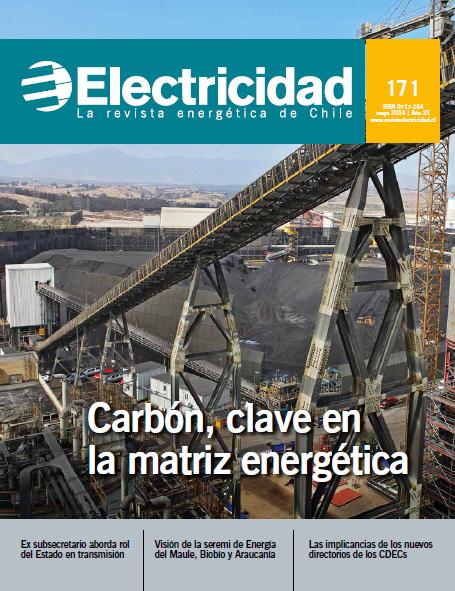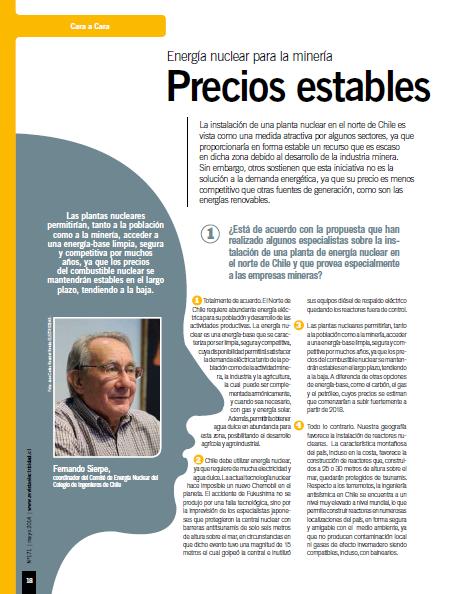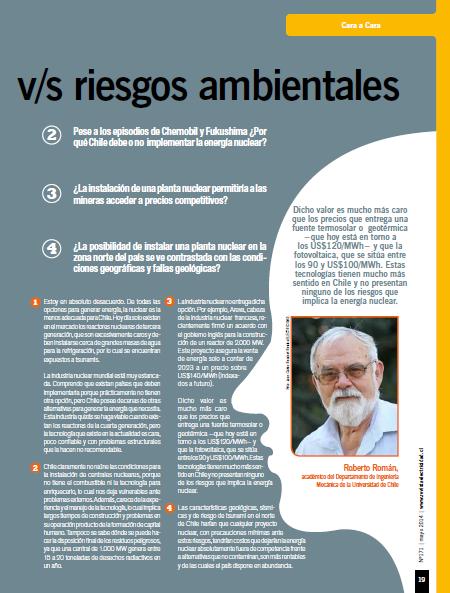
The May edition of Electricity Journal featured an interesting interview between Fernando Sierpe, the Coordinator of the Nuclear Energy Committee of the Engineering School of Chile, and Roberto Román, an academic of the Department of Mechanical Engineering of University of Chile. In the article they discuss their opposing views on installing a nuclear energy plant in northern Chile.
Román, who is also in charge of Academic Outreach and International Relations at SERC Chile, argues that nuclear energy is the least suitable kind of energy for our country for various reasons. Among them, he mentions the high price of reactors, the exposure of nuclear plants to tsunamis, and how unreliable the technology still is. But his main reason is that there are multiple alternatives of renewable energy, such as geothermic, photovoltaic and solar, that make much more sense for Chile and have much less associated risk.
To learn more about Roberto Roman’s opinion, click here www.revistaelectricidad.cl and search for this interview.
Nuclear energy for the mining sector: Stable prices versus environmental risks
The construction of a nuclear plant in the north of Chile is an attractive measure for some sectors since it would give a stable provision of a resource that is scarce in that area due to the development of the mining sector. However, there are others who suggest that this is not the solution for energy demand, since its price is less competitive than other generation sources, such as renewable energies.
Fernando Sierpe, coordinator of the Nuclear Energy Commission from the Chilean School of Engineers
Do you agree with the proposal that some specialists have put forward in relation to the construction of a nuclear energy plant in the north of Chile that could supply energy to mining companies?
I totally agree. The north of Chile requires a large amount of power for its population and the development of productive activities. Nuclear energy is a clean, safe and competitive base-energy whose availability will allow us to satisfy the power demand of the population and the mining, agriculture, and industry sectors, which can be harmoniously complemented, when necessary, with gas and solar energy. In addition, it will allow collecting fresh water in abundance for this area, allowing agricultural and agro-industrial development.
Considering the events that happened in Chernobyl and Fukushima, why should Chile implement nuclear energy?
Chile must use nuclear energy, since the country requires the use of a lot of power and fresh water. The current nuclear technology makes it impossible to have a new Chernobyl in the planet. The Fukushima accident was not a product of a technological failure, but a lack of foresight from Japanese specialists who protected the nuclear plant with anti-tsunami barriers of only 6 meters high. The tsunami caused waves of 15 meters which hit the plant and made the electric backup diesel equipment useless and caused the reactors to go out of control.
Will the construction of a nuclear plant allow mining companies to access more competitive prices?
Nuclear plants would allow, both to the population and the mining sector, to access clean, safe and competitive base energy for many years, since nuclear combustion prices will remain stable in the long-term, with a tendency to decrease. This is in comparison to other base energies, such as carbon, gas and oil, whose prices are estimated to sharply increase from 2018 onwards.
Is the possibility of constructing a nuclear plant in the north of the country contrasted by geographical conditions and geological faults?
On the contrary, our geography favors the construction of nuclear reactors. The mountainous characteristic of our country, including the coast, supports the construction of reactors which built 25 or 30 meters above the sea level, would be protected against tsunamis. In relation to earthquakes, the anti-seismic engineering in Chile is very advanced globally which allows, since they do not produce local contamination or greenhouse gases, the safe and environmentally-friendly construction of reactors in several locations of the country. They could even be safe in resorts.
Roberto Román, academician from the Mechanical Engineering Department at Universidad de Chile
Do you agree with the proposal that some specialists have put forward in relation to the construction of a nuclear energy plant in the north of Chile that could supply energy to mining companies?
I totally disagree. Of all energy options available, nuclear is the least suitable one for Chile. Nowadays, there are only third generation nuclear reactors in the market, which are really expensive and have to be constructed near huge water bodies for cooling the system and, therefore, they are vulnerable against tsunamis.
The world’s nuclear industry is very stuck. I understand that some countries must use it because they practically do not have another option, but Chile has dozens of other alternatives to produce the energy that it needs. This industry may be viable when there are fourth generation reactors, but with the current technology it is expensive, not reliable and it has structural problems that do not make it advisable for use.
Considering the events that happened in Chernobyl and Fukushima, why should Chile implement nuclear energy?
Chile clearly does not meet the conditions to construct nuclear plants because it does not have the fuel or the technology to supply it, which makes us vulnerable against external problems. In addition, the country lacks the experience or management to use this technology, which implies longer construction periods and operational problems due to human capital formation. It is also not known where the final waste disposal of dangerous material would be, since a 1,000 MW plant generates between 15 and 20 tons of radioactive waste per year.
Will the construction of a nuclear plant allow mining companies to access more competitive prices?
The nuclear industry does not give that option. For example, Areva, the head of the nuclear industry in France, recently signed an agreement with the English government for the construction of a 2,000 MW plant. This project can only secure energy sale from 2023 onwards at US $140/MWh price (index future analysis).
This value is more expensive than the prices a thermosolar or geothermal source can give – which is today around US$120/MWh – or a photovoltaic source, which is around 90 and US$100/MWh. These technologies make more sense in Chile and do not present the risks that nuclear energy exposes.
Is the possibility of constructing a nuclear plant in the north of the country contrasted by geographical conditions and geological faults?
The geological, seismic and tsunami risk factors in the north of Chile would make any nuclear project, even with the minimal care, too expensive to be able to compete against non-contaminating alternatives, which are more profitable and which the country has an abundance to choose from.




